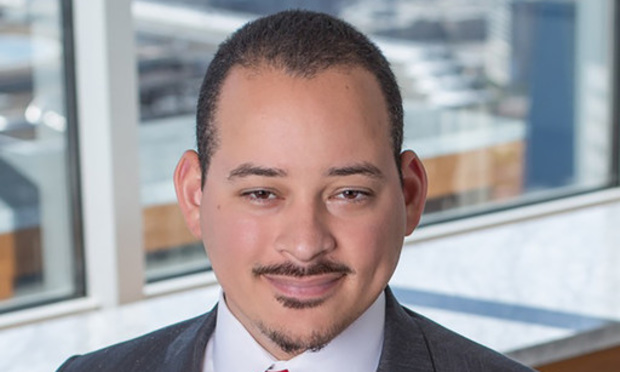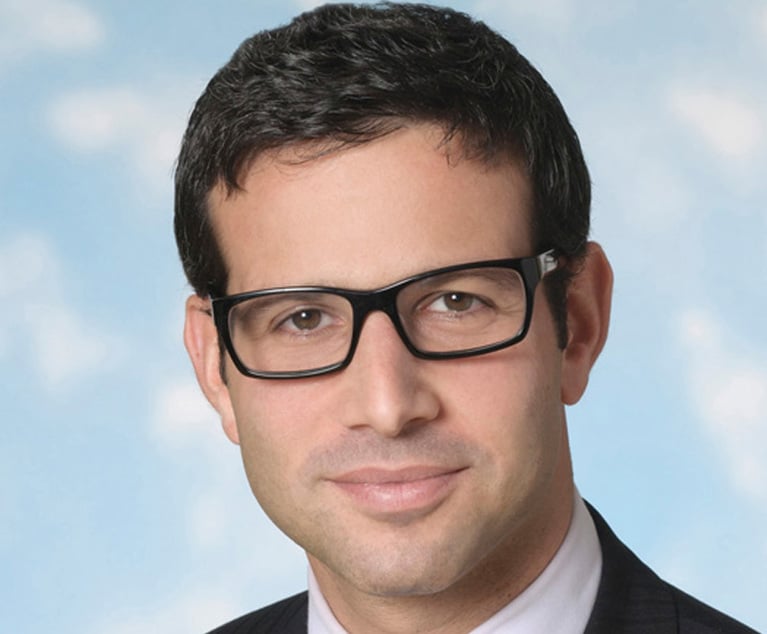On the Rise 2018: Ricardo Bonilla
Ricardo Bonilla, associate, Fish & Richardson
August 31, 2018 at 06:00 AM
5 minute read
 Ricardo Bonilla, with Fish & Richardson.
Ricardo Bonilla, with Fish & Richardson.
Ricardo Bonilla, associate, Fish & Richardson
Experience:
- Fish & Richardson, 2012-present
Education:
- Texas Tech University School of Law, 2012
- University of Texas at Dallas, 2009
What drew you to a career in law?
The opportunity to use my knowledge and experience to help others who find themselves in challenging situations. The law presents unique and difficult problems, and I have always enjoyed tackling and solving problems.
Have you set a specific goal that you want to achieve in the next year?
I want to be ready for the next phase of my career. Specifically, I want to improve my efforts in cultivating relationships that can lead to business relationships down the road. I have focused almost exclusively so far in my career on working the cases to which I am assigned, but I know I need to build and maintain a network that can bring work into the firm, too.
What has been your proudest career moment and your biggest hurdle?
My proudest career moment so far was arguing and winning the second Federal Circuit appeal on a case that I was staffed on from day one and that I was immediately given the opportunity to play a major role in across all aspects of the case. The client attended the argument and was very happy with both my performance and, obviously, the result, and it felt tremendous to achieve such a great result on a case I had seen and helped run from start to finish for a client I had gotten to know well. My biggest hurdle has been knowing my limits and when to say I have no bandwidth—my workaholic attitude has led to some stressful (but fun!) moments in my career.
Where do you fit on a 1-10 work-life balance scale with 10 being nirvana? Please explain.
I choose 5 because I actually think that is more “nirvana” than 10. I take 10 to mean I have balanced the two exactly how I want to, but of course, that would mean I would want less work, more life—that is not realistic. I work hard, but I love my work, and it has led to some incredible experiences that often do not feel like work. And working so hard means sacrifices in my personal life, but not so many that I consider it a negative. I feel like I get the best of both worlds, and realistically, that's a 5.
What is the top quality that you've used to succeed in the profession?
Efficiency. I learned early on to focus on the things that matter, those that actually advance positions, and not to spend too much time on things I know to be peripheral. Getting the most out of the time I spend working has helped me take on more opportunities than I would have expected at this point in my career, and the more opportunities I have gotten, the more chances I have had to succeed.
Who is your favorite mentor and why?
David Conrad, a principal at Fish and a very recent prior recipient of this award, represents the best kind of mentor because he is also a fantastic sponsor. He has not only helped teach me how to practice law and helped cultivate my skills, but also he has been directly responsible for giving me opportunities that many attorneys wait years to get, and he gave them to me early on. I cannot thank him and others like him enough for how they have helped and continue to help my career.
What's the best advice anyone has ever given you?
The director of advocacy at Tech Law always told my moot court teams, “We will never be out-cased.” He meant that no matter who we went up against, we would always know the case law better and—on a related note—be better prepared. I took that to heart, and I practice it to this day. There may be better attorneys, but nobody will be better prepared than I am.
What trends are you observing in the profession that you're excited about?
The NextGen initiative that many judges have bought into has been very exciting. We are seeing younger attorneys getting incredible opportunities earlier and earlier in their careers, and that is contributing to an increase in the diversity of thought in our profession.
What is the greatest challenge you see for the legal profession?
Attorneys are also known as “counselors” because we do not just practice law on behalf of our clients—we counsel them on a far wider range of topics. That role brings with it an increased responsibility to our communities and to society, and the legal profession will need to work hard to meet that challenge.
This content has been archived. It is available through our partners, LexisNexis® and Bloomberg Law.
To view this content, please continue to their sites.
Not a Lexis Subscriber?
Subscribe Now
Not a Bloomberg Law Subscriber?
Subscribe Now
NOT FOR REPRINT
© 2025 ALM Global, LLC, All Rights Reserved. Request academic re-use from www.copyright.com. All other uses, submit a request to [email protected]. For more information visit Asset & Logo Licensing.
You Might Like
View All
Kirkland's Daniel Lavon-Krein: Staying Ahead of Private Equity Consolidation

Vinson & Elkins: Traditional Energy Practice Meets Energy Transition
4 minute read
Advising 'Capital-Intensive Spaces' Fuels Corporate Practice Growth For Haynes and Boone
4 minute read
Get to Know Texas Lawyer's Attorney of the Year Finalists
Trending Stories
- 1Critical Mass With Law.com’s Amanda Bronstad: LA Judge Orders Edison to Preserve Wildfire Evidence, Is Kline & Specter Fight With Thomas Bosworth Finally Over?
- 2What Businesses Need to Know About Anticipated FTC Leadership Changes
- 3Federal Court Considers Blurry Lines Between Artist's Consultant and Business Manager
- 4US Judge Cannon Blocks DOJ From Releasing Final Report in Trump Documents Probe
- 5White & Case KOs Claims Against Voltage Inc. in Solar Companies' Trade Dispute
Who Got The Work
J. Brugh Lower of Gibbons has entered an appearance for industrial equipment supplier Devco Corporation in a pending trademark infringement lawsuit. The suit, accusing the defendant of selling knock-off Graco products, was filed Dec. 18 in New Jersey District Court by Rivkin Radler on behalf of Graco Inc. and Graco Minnesota. The case, assigned to U.S. District Judge Zahid N. Quraishi, is 3:24-cv-11294, Graco Inc. et al v. Devco Corporation.
Who Got The Work
Rebecca Maller-Stein and Kent A. Yalowitz of Arnold & Porter Kaye Scholer have entered their appearances for Hanaco Venture Capital and its executives, Lior Prosor and David Frankel, in a pending securities lawsuit. The action, filed on Dec. 24 in New York Southern District Court by Zell, Aron & Co. on behalf of Goldeneye Advisors, accuses the defendants of negligently and fraudulently managing the plaintiff's $1 million investment. The case, assigned to U.S. District Judge Vernon S. Broderick, is 1:24-cv-09918, Goldeneye Advisors, LLC v. Hanaco Venture Capital, Ltd. et al.
Who Got The Work
Attorneys from A&O Shearman has stepped in as defense counsel for Toronto-Dominion Bank and other defendants in a pending securities class action. The suit, filed Dec. 11 in New York Southern District Court by Bleichmar Fonti & Auld, accuses the defendants of concealing the bank's 'pervasive' deficiencies in regards to its compliance with the Bank Secrecy Act and the quality of its anti-money laundering controls. The case, assigned to U.S. District Judge Arun Subramanian, is 1:24-cv-09445, Gonzalez v. The Toronto-Dominion Bank et al.
Who Got The Work
Crown Castle International, a Pennsylvania company providing shared communications infrastructure, has turned to Luke D. Wolf of Gordon Rees Scully Mansukhani to fend off a pending breach-of-contract lawsuit. The court action, filed Nov. 25 in Michigan Eastern District Court by Hooper Hathaway PC on behalf of The Town Residences LLC, accuses Crown Castle of failing to transfer approximately $30,000 in utility payments from T-Mobile in breach of a roof-top lease and assignment agreement. The case, assigned to U.S. District Judge Susan K. Declercq, is 2:24-cv-13131, The Town Residences LLC v. T-Mobile US, Inc. et al.
Who Got The Work
Wilfred P. Coronato and Daniel M. Schwartz of McCarter & English have stepped in as defense counsel to Electrolux Home Products Inc. in a pending product liability lawsuit. The court action, filed Nov. 26 in New York Eastern District Court by Poulos Lopiccolo PC and Nagel Rice LLP on behalf of David Stern, alleges that the defendant's refrigerators’ drawers and shelving repeatedly break and fall apart within months after purchase. The case, assigned to U.S. District Judge Joan M. Azrack, is 2:24-cv-08204, Stern v. Electrolux Home Products, Inc.
Featured Firms
Law Offices of Gary Martin Hays & Associates, P.C.
(470) 294-1674
Law Offices of Mark E. Salomone
(857) 444-6468
Smith & Hassler
(713) 739-1250






